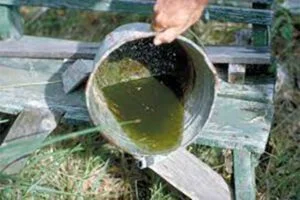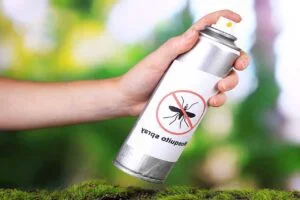Identifying Mosquito Breeding Sites
This is an important step in effectively controlling mosquito populations and preventing mosquito related problems. Mosquitoes need standing water to lay their eggs and their larvae grow into adults. Therefore, identifying and eliminating these breeding sites is key to reducing their numbers.
1) Mosquitoes usually lay their eggs in still or slow moving water. Female mosquitoes are attracted to water sources, which can be as small as a bottle cap or as large as a pond.
2) Some common places where mosquitoes lay eggs include flower pots, birdbaths, clogged drains, old tires, puddles, and any other container or place that can hold water for days.
3) Sometimes, small water sources are easy to overlook, such as saucers under potted plants or things left in the yard. Even a small amount of water is enough for mosquitoes to breed and reproduce.
4) Mosquitoes can travel from one area to another, so a concerted effort can have a more significant impact on reducing their overall numbers.
5) Drain any standing water from pots, bird baths and flower pot saucers. Disposing of those items properly can collect water. Keep gutters clear and free of debris to prevent water from pooling.
6) Stagnant or untreated pool water can become a breeding ground for mosquitoes.
7) In areas where standing water cannot be removed or treated, consider using larvicides, chemicals designed to kill mosquito larvae before they become adults.
8) Heavy rainfall or leakage may lead to temporary ponding or waterlogging, which should be addressed immediately.
Eliminating Standing Water
Eliminating standing water is a very effective measure to combat mosquito problems. Mosquitoes need standing water to lay their eggs and their larvae grow into adults. By removing these breeding sites, you can significantly reduce the mosquito population around your home. Here’s how you can eliminate standing water and control your mosquito situation:
1) Thoroughly inspect any areas where water may have accumulated. Look for places like empty containers, buckets, old tires, clogged drains, or even tarps or covers that can collect rainwater. Mosquitoes breed in even the tiniest water.
2) Clear away any debris, leaves, or vegetation that may obstruct water flow. Ensuring that water flows freely and does not stand still will prevent mosquitoes from finding suitable breeding grounds.
3) Empty any containers that contain water such as flower pots, birdbaths and pet water bowls. Clean them regularly to prevent mosquitoes from laying eggs on surfaces.
4) Get rid of any unnecessary items that may collect rainwater such as old tires, unused buckets or discarded toys.
5) Maintaining a swimming pool or pond is important. Stagnant swimming pool water can become a breeding ground for mosquitoes. If you have a pond, consider adding fish that feed on mosquito larvae.
6) Clean gutters and drains regularly to prevent water from accumulating and providing a breeding ground for mosquitoes.
7) Where you cannot remove standing water, consider using mosquito nets.
8) Mosquitoes can travel from one property to another, so encourage your neighbors to remove standing water from their premises as well.
9) Mosquitoes can quickly find new breeding spots, especially after rain. Be vigilant and check your property regularly for any changes that could create standing water.
Natural Repellents vs. Chemical Repellents
When it comes to protecting ourselves from pesky mosquitoes, we are often faced with a choice between natural repellants and chemical repellants. Both options aim to keep mosquitoes away, but they have different ingredients and modes of action. Let’s take a closer look at natural repellants and chemical repellants:
Natural Repellents:
1) Natural repellents are made from plant-based substances, essential oils and other natural extracts known for their mosquito-repellent properties. Some common natural repellents include citronella, lemon eucalyptus, lavender, peppermint, and neem oil.
2) Natural repellants are generally considered safe for use on the skin and are less likely to cause skin irritation or allergic reactions than chemical repellants.
3) Natural remedies are often considered more environmentally friendly because they are derived from renewable resources and do not contain harmful chemicals that can affect the ecosystem.
4) Although natural repellents can be effective in keeping mosquitoes at bay, their protection usually lasts for a shorter period of time than chemical repellents.
Chemical Repellents:
1) Chemical repellents consist of artificial compounds like DEET (N,N-Diethyl-meta-toluamide), picaridin, or IR3535.
2) Chemical repellents have been extensively tested for safety and effectiveness by regulatory agencies. They are generally safe when used as directed, but some people may experience skin irritation or other adverse reactions.
3) Chemical repellents offer extended protection, needing fewer reapplications compared to natural repellents. They are particularly effective in high-risk areas with intense mosquito activity.
4) Chemical repellents come in different strengths, with higher concentrations providing longer protection.
Choosing the right resistor:
1) Some people prefer natural repellants because of their plant-based ingredients, while others may choose chemical repellants for their long-lasting protection.
2) If you are concerned about the environment, natural deterrents may better align with your values.
3) Assess the level of mosquito activity in your area and select a repellent that matches your needs. In areas with a high risk of mosquito-borne diseases, you may want to consider stronger chemical repellents.
4) Regardless of preservative type, always follow label directions and take necessary safety precautions, such as avoiding contact with eyes and broken skin.
Landscaping for Mosquito Control
Landscaping plays a powerful tool in controlling mosquito populations around your home. By strategically planning your landscape design, you can prevent mosquitoes from breeding and resting in your yard, creating a more pleasant environment for you and your family. Here are some landscaping tips and tricks for effective mosquito control:
1) The first step in landscaping for mosquito control is to eliminate standing water in your yard. Mosquitoes breed in stagnant water.
2) Incorporate mosquito-repellent plants into your landscape design. Plants such as lavender, rosemary, citronella, marigold and basil emit scents that mosquitoes find unpleasant.
3) Mosquitoes are attracted to moisture, so aim to make the yard as dry as possible. Avoid overwatering your lawn and consider using drought-resistant plants.
4) Attract natural mosquito predators like birds, bats and dragonflies to your yard.
5) While mulch can be beneficial to your plants, it also holds moisture, which can attract mosquitoes.
6) Mosquitoes like to rest in tall grass, so keeping your lawn well maintained and trimmed will reduce potential resting places for these pests.
7) Mosquitoes are poor flyers and find it difficult to fly in the air. Install outdoor fans on your patio or porch to create a gentle breeze that repels mosquitoes.
8) Mosquitoes are attracted to bright lights, so consider using LED yellow or amber lights for outdoor lighting.
9) Butterflies are not only beautiful but also eat nectar, which reduces mosquito populations by competing for food sources.
10) Regularly trim bushes and trees to reduce mosquito hiding places during the day.
11) Overwatering can lead to pits and stagnant water, which are prime breeding grounds for mosquitoes.
Installing Mosquito Nets and Screens
Mosquito nets and screens are effective and practical solutions for keeping mosquitoes and other flying insects at bay while still enjoying fresh air and natural light indoors and outdoors. Whether you want to protect your sleeping space, installing mosquito nets and screens can provide a barrier that prevents these pesky insects from entering your living spaces. Here’s how to effectively use and install mosquito nets and screens:
Indoor Mosquito Nets:
1) For bedrooms, consider using bed canopy nets that hang from the ceiling. These nets wrap around your bed, creating a protective barrier.
2) Install mosquito nets on windows for proper ventilation while preventing mosquitoes from entering your home.
3) Protect babies from mosquito bites by using nets hanging over their cribs or bassinets.
4) If you are traveling to an area with high mosquito activity, bring a portable and lightweight travel net.
Outdoor Mosquito Screen:
1) If you have an outdoor seating area, consider enclosing it with curtains to create a mosquito-free zone.
2) For added flexibility, invest in retractable screens that can be lowered when needed and retracted when not in use.
3) When camping or spending time in temporary shelters, use tents with zipper screens to keep out mosquitoes while allowing for airflow.
Tips for installation and maintenance:
1) Make sure mosquito nets and curtains are properly sized for the windows or outdoor areas you want to protect Please measure the dimensions correctly before buying.
2) Check for any gaps or openings in the net or screen and seal properly.
3) Keep nets and curtains clean by regularly dusting and washing.
4) Check the screens for tears or damage and repair or replace them immediately to maintain their functionality.
5) Whether you are installing a permanent screen or a temporary net, always follow the manufacturer’s instructions for proper setup and maintenance.
Using Mosquito Traps Effectively
Mosquito traps are valuable tools for reducing the number of mosquitoes around your home and creating a more comfortable and pleasant outdoor environment. When used correctly, mosquito traps can be extremely effective in targeting adult mosquitoes and disrupting their reproductive cycle. Here are some tips for using mosquito traps effectively:
1) Strategically place mosquito traps where mosquito activity is high.
2) Mosquitoes are most active during the early morning and evening hours, at dawn and dusk. Set mosquito traps in the late afternoon or early evening to catch the highest number of mosquitoes.
3) Different types of mosquito traps may have specific setup and maintenance instructions. Always follow the manufacturer’s instructions to ensure the trap works optimally.
4) Clean traps regularly to remove trapped mosquitoes and debris.
5) Some mosquito traps use carbon dioxide as an additional attractant, mimicking human breathing.
6) Mosquito traps work best when used in conjunction with other mosquito control measures, such as standing water elimination and repelling.
7) To avoid attracting mosquitoes to your outdoor living areas, keep mosquito nets away from places where you and your family spend time outdoors.
8) Mosquito traps are most effective during peak mosquito season.
9) Inspect the trap regularly for any damage. Replace attractors and components as necessary to ensure the trap continues to operate efficiently.
10) If you have children or pets, make sure the trap is placed in a place that is out of their reach to avoid accidental contact.
By using mosquito traps effectively, you can significantly reduce the mosquito population around your home and enjoy your outdoor spaces with less mosquito worry.
Find professional pest control services
When faced with persistent mosquito problems or high infestation levels, seeking out professional pest control services can be a wise and efficient solution. Here are some reasons you should consider
seeking professional pest control services
for your mosquito problem:
1) Pest control professionals understand the behavior and habits of mosquitoes, which allows them to create targeted and customized treatment plans.
2) Each property is unique, and pest control experts will evaluate your specific situation to develop a treatment plan that effectively addresses your mosquito problems.
3) Professionals can identify and eliminate potential mosquito breeding sites on your property, ensuring that the source of the infestation is properly addressed.
4) Pest control companies use safe and approved pesticides and treatments that are effective in controlling mosquitoes while minimizing damage to people, pets and the environment.
5) Professional treatments often provide more extended protection than over-the-counter solutions, giving you a mosquito-free environment for an extended period of time.
6) Mosquitoes are known to carry several diseases including malaria, dengue fever, Zika virus and West Nile virus. Professional pest control can help reduce the risk of this disease by controlling mosquito populations.
7) Many pest control companies practice IPM, which is a holistic and environmentally friendly approach to pest management.
8) Pest control professionals often schedule follow-up inspections and maintenance to ensure that mosquito populations remain under control over time.
Tips for choosing a pest control company:
1) Make sure companies and technicians have the necessary certifications and licenses to perform pest control services in your area.
2) Request quotes from multiple pest control companies to compare prices and services offered.
3) Inquire to ensure that the treatment methods used by the company are consistent with your preferences and safety concerns
4) Check if the company offers any guarantee or warranty on their services.







